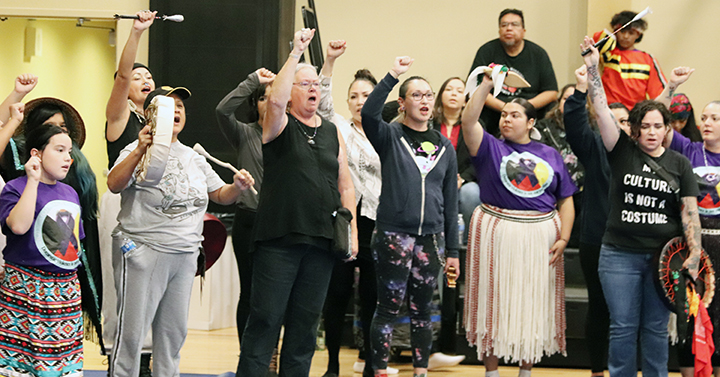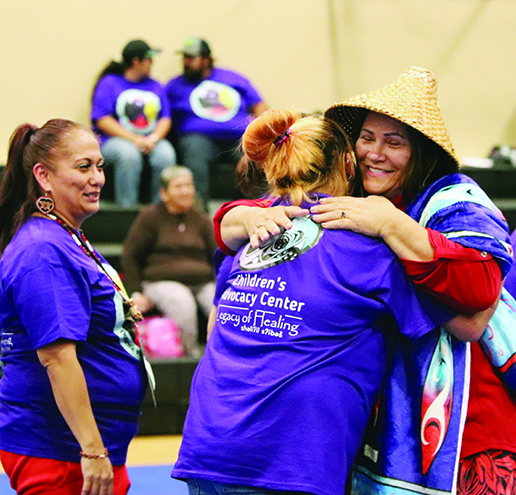
“More than four in five American Indian and Alaska Native adults (83 percent) have experienced some form of violence in their lifetime. That’s almost 3 million people who have experienced psychological aggression or physical violence by intimate partners, stalking, or sexual violence.”
-National Institute of Justice
By Kalvin Valdillez
Nearly one year ago, the Legacy of Healing brought Tulalip together for the first annual Domestic Violence Awareness Month Coastal Jam Dinner. It was both an emotional and powerful night where many survivors of domestic violence (DV) bravely shared their story and stood together in solidarity. Through the traditional medicines of drumming and singing, the cultural gathering marked a moment in time that survivors can look back upon and recognize as the start of their healing journey.
To help raise awareness, show support, educate community, and provide resources to DV survivors, the Legacy of Healing participates in a national initiative known as Domestic Violence Awareness Month. Every October, for the past several years, the department has been active in the community and facilitated a number of events, trainings, and cultural activities to help bring a better understanding of what DV is and how it affects us as Native people.
“A lot of times victims experience DV outside of public view and it happens in secret in their own homes,” explained Legacy of Healing Coordinator, Kaley Wickham. “October is a time for us to raise awareness for DV. Most, if not all, of the survivors we work with have also witnessed DV when they were children, or they know other family members or friends who have also experienced it. So, it’s a very normalized part of their life and yet people aren’t able to recognize it or talk about it.”
The National Institute of Justice reports that tribal communities experience DV at a much higher rate than any other race or ethnicity throughout the country. Through their study, they evaluated that more than 1.5 million women, and 1.4 million men (A/I and Alaskan Native) have experienced violence in their lifetime. And because some are either stuck in the cycle of DV, have a fear of coming forward, or are unable to recognize their abuse as DV, those numbers may very well be underreported.
Joan Smith, Legacy of Healing Victim Advocate, shared, “Speaking out against it is difficult. First you have to recognize it, and that’s a difficult task. So that’s one of our big points of the awareness month. DV affects everyone around you, not just you and your partner. It affects your children, friends, and other family members. It’s not just physical. It’s intimidation and power over a person, and there are a lot of different ways to do that.”

To help identify DV, the Legacy of Healing compiled a list of examples that reads as follows:
What Abuse Can Look Like
- Hitting, pinching
- Kicking
- Burning
- Pulling hair
- Pushing
- Strangulation
- Physical intimidation
- Use of weapons
- Forcing the use of substance
- Throwing items
- Punching walls
- Kicking in doors
- Requesting your login info
- Monitoring your social media
- IPV sexual abuse
- Forcing any sexual acts
- Uses children against you
- Lies about your mental health
- Financial control
- Name calling
- Jealousy
- Shaming or humiliating you
- Blaming you for their actions
- Controlling where you go
- Gaslighting
- Love bombing
- Stalking
If you are experiencing any forms of abuse listed above, please reach out to the Legacy of Healing. The program has a strict confidentiality policy and can answer any of your questions, whether you are looking to obtain information for yourself or a loved one. Additionally, the Legacy of Healing is careful not to pass judgement and allows their clients grace and understanding, because from a statistical standpoint, it could take a survivor multiple attempts to leave an abusive partnership for good.
When you’re ready to take that next step, the Legacy of Healing can help design a safety plan with you and is prepared to be with you every step along the way.
Angelica Trinidad is a new edition to the Legacy of Healing team and serves as the program’s General Crime Victims Advocate. During a conversation about identifying DV within our community, she stressed an important message to those who may be worried about reporting their abuse and seeking aid, “Confidentiality means confidentiality when it comes to the Legacy of Healing. I think it’s important for people to understand that.”
When asked about the types of support that the Legacy of Healing can provide to a survivor, Interim Lead Advocate, Marisa Chavez, said, “It’s case by case and depends on the needs of survivors and where they need empowerment in that situation. We’re their silent cheerleaders, giving them the empowerment that they need to keep moving forward.”
The Legacy of Healing will have a raffle throughout the entire awareness month. Tickets can be purchased at $5 a ticket or $20 for 5 tickets. Prizes have yet to be unveiled, so keep an eye out for that announcement. If the prizes are anything like last year’s items, then we’re in store for some top tier and highly desirable winnings. But most importantly, in regard to the raffle, all proceeds will help support local survivors of DV throughout the year.
To purchase a raffle ticket, you can catch the Legacy of Healing team at the following dates/events/times:
Tuesday 10/1 – Admin building (2nd floor), 11:30 a.m. – 1:30 p.m.
Saturday 10/19 – Semi Annual General Council, 9:00 a.m. – 1:00 p.m.
Friday 10/25 – DV Awareness Coastal Jam, 5:30 p.m. – 7:30 p.m.
Thursday 10/31 – Tulalip Employee Halloween Party, 12:00 p.m. – 2:00 p.m.
Although this article is focused on DV Awareness Month, we thought it was crucial to share this bit of information about the recent evolution of the Legacy of Healing and the clients they can take on.
Kaley announced, “We recently expanded our services, so now we serve adult victims of any and all crimes. Before it was intimate partner domestic violence, sexual assault, stalking, and sex trafficking. Now we serve all crimes including family violence, burglary, theft, arson, elder abuse.”
The Legacy of Healing is asking you to show your support to survivors of DV throughout the month of October. You can do so by purchasing a raffle ticket, wearing the color purple on October 17, and attending the coastal jam.
The DV Awareness Month Coastal Jam Dinner is set for October 25, and will take place at the Teen Center’s gymnasiums from 6:00 p.m. – 10:00 p.m. So be sure to tell all your friends, and any jammers you know, to join in on an evening of healing and help amplify the voices of all the local survivors.
Said Kaley, “We’re not just talking about this issue during DV Awareness Month; we also want to promote healing, because our program is here to support survivors through their healing. So being able to do a coastal jam and incorporate the culture into that can show survivors in attendance a path forward, and that their community does support them.”
If you or a loved one is experiencing an abusive relationship, please do not hesitate to call the Legacy of Healing at (360) 716-4100 for assistance.
“You don’t need to live with violence in your home,” urged Marisa. “The Legacy of Healing is here for you to utilize for help. Once you speak to an advocate, you will be provided with information to learn the next steps on your healing journey to living a domestic violence free life. It may be tedious, but you will find that you have the inner strength and support to make that happen. You don’t need to walk this journey alone to healing. We are here for you.”
If you are in a crisis or an emergency situation, the Legacy of Healing provided a list of three additional hotline numbers that you can utilize during your time of need:
- The National Domestic Violence Hotline 1-800-799-SAFE (7233)
- Strong Hearts Native Helpline: 1-844-762-8483
- Domestic Violence Services of Snohomish County 425-25-ABUSE (22873)